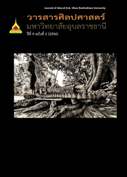การศึกษาวนเกษตรในระดับเกษตรกร และชุมชนเพื่อการพึ่งตนเอง
Main Article Content
บทคัดย่อ
วัตถุประสงค์ของการวิจัยเพื่อ 1) ศึกษาแนวทางการบริหารจัดการปลูกป่าที่เหมาะสม 2) พัฒนารูปแบบวนเกษตรที่เหมาะสม จากการศึกษาวิจัยโดยใช้วิธีการศึกษาเชิงคุณภาพ ซึ่งประกอบด้วย การศึกษาเอกสาร การสัมภาษณ์ และการสังเกตแบบมีส่วนร่วม จากกลุ่มเกษตรกรหรือชุมชน หรือองค์กรภายในเขตจังหวัดอุดรธานี ที่ทำการเกษตรเกี่ยวข้องกับวนเกษตร มามากกว่า 10 ปี ในจังหวัดอุดรธานี จำนวน 96 คน พบว่า แนวทางการบริหารการปลูกป่าที่เหมาะสมในรูปแบบบุคคลจำนวน 2 แห่ง รูปแบบชุมชนจำนวน 1 แห่ง และรูปแบบองค์กรจำนวน 2 แห่ง ที่มีการเชื่อมโยงกับภาครัฐ ราชการและหน่วยงานเอกชนที่เกี่ยวข้องมาก่อนอย่างน้อย 20 ปี พบว่าเกษตรกรที่ทำวนเกษตรส่วนใหญ่เป็นชาย และไม่ได้เรียนหนังสือ มีที่ดินถือครองเฉลี่ย 20 - 50 ไร่ อาศัยแหล่งน้ำธรรมชาติและน้ำฝนเป็นหลัก ซึ่งการพัฒนารูปแบบที่เหมาะสม พบว่ารูปแบบบุคคลและรูปแบบชุมชน ต้องการปลูกป่าตามหัวไร่ปลายนา เป็นส่วนหนึ่ง ของการปลูกป่าของตนหรือของชุมชนให้ชัดเจน ส่วนรูปแบบองค์กรให้มีการสนับสนุนช่วยเหลือกันและกัน เช่น สหกรณ์ โดยมีการสนับสนุนงบประมาณ หรือวัสดุอื่น ๆ มีรายได้เฉลี่ยต่อปีประมาณ 50,000 - 100,000 บาท รับรู้ข่าวสารดูแลรักษาป่าส่วนใหญ่จากโทรทัศน์ ส่วนการให้ความร่วมมือทำกิจกรรมพัฒนาการปลูกรักษาในท้องถิ่นมีมากกว่า 6 ครั้งต่อปี ปัญหาและอุปสรรคที่สำคัญ คือ น้ำเพื่อการเกษตร และราคาสินค้าเกษตรไม่คงที่ เกษตรกรมีทัศนคติเห็นด้วยเป็นอย่างยิ่ง คือ ป่าของเกษตรกรเป็นของครอบครัวส่วนป่าชุมชนเป็นของส่วนรวมต้องช่วยกันปลูกและดูแลรักษาเพื่อได้ประโยชน์ร่วมกันตลอดไปวนเกษตร เป็นแหล่งอาหารและยารักษาโรค เกษตรกรเห็นว่า ไม่ควรกำ หนดกฎหมายพระราชบัญญัติป่าไม้กับครอบครัวผู้ปลูกป่าในพื้นที่ของเกษตรกรอันยังประโยชน์แก่ส่วนรวมร่วมกัน ด้านพฤติกรรม พบว่า เกษตรกรเข้าร่วมประชุมเกี่ยวกับการอนุรักษ์ป่าอย่างสม่ำเสมอ มีแนวความคิดในการสร้างบำนาญชีวิตให้แก่ลูกหลานโดยการปลูกป่าวนเกษตรทั้งในส่วนในไร่นาของเกษตร
The Study on Agroforestry for Self–Reliance of Farmers and Communities
This research aims 1) to determine an appropriate approach to forest management, and 2) to develop an appropriate model for agroforestry. This study has been conducted with qualitative research by studying documents, carrying out interviews and observing participants. The population for the study consists of 96 people representing groups of farmers, and representing communities and organizations in the area of Udonthani province. The participants have been involved in agriculture and agroforestry for more than 10 years. The research is based on the forest management of two individuals, one community, and two organizations that have worked cooperatively with the government sector and involved private sectors for at least 20 years. We found that farmers who worked on ago-forestry were males who did not receive schooling. The average land according to documents of ownership they possessed was between 20 to 50 rais. Their agroforestry mainly depended on natural water resources and rain. We sought to develop an appropriate model for an individual and a community. We found that farmers want the government sectors which are involved to clearly indicate the areas of forest that either belong to individual farmers or to the community. In regard to a model for organizations, each organization should support and help other organizations. An example is to establish a cooperative that supports a budget and the necessary tools of agriculture which the organizations use. Additionally, our results show that the average annual income for a farmer is between 50,000 and 100,000 baht peryear. Farmers mainly follow the news through TV. They carry out activities related to the conservation of local forest more than six times a year. The farmers face certain problems such as lack ofwater for agricultural purposes and the fluctuating prices ofagricultural products. They also agree that their own forest shouldbelong to their family. At the same time, the community forestshould belong to every community member. Everyone mustcooperate in planting and conserving for the mutual interest. Thefarmers believe that ago-forestry provides a source of food andmedicine. Additionally, farmers think the Forest Act should not beenacted against any families who plant trees in areas whereeveryone can mutually make use of the trees. We found thatfarmers usually participate in meetings concerning forestconservation. They also plan to provide a life pension to theirchildren by doing ago-forestry on their own lands and farms. Toaccomplish this, they need support from the government sectors toestablish a cooperative, provide training, and indicate the direction for continuing development of forests.


